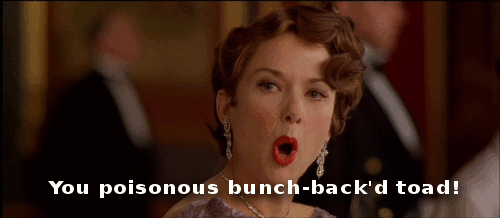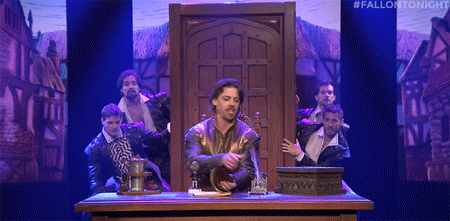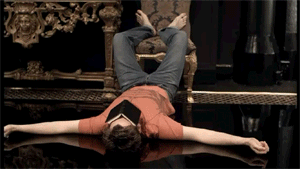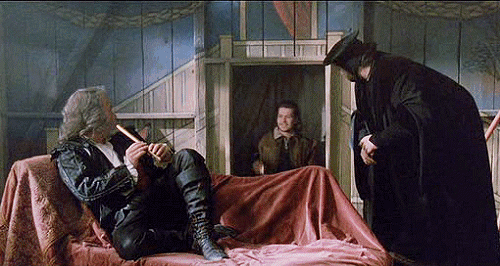Shakespeare isn’t just for professional actors at The Globe Theatre! You’ll need a Shakespearean piece for college and professional regional theatre auditions. Below are ten other reasons why you should perform The Bard at least once in high school (or in your life, for that matter).
You’ll have incredibly stellar diction.

Your director always tells you to “ENUNCIATE!” right? Shakespeare’s language requires the actor to say words and phrases that people don’t usually say on a regular basis. The Bard begins and ends many of his lines with hard consonant sounds like b, d, t, k, and ng. Do at least five minutes of diction exercises prior to every performance. Make sure you enunciate those b’s and t’s in “battle,” and you’ll be set to charge unto the breach! From then on, you’ll be so used to enunciating your words that saying your lines will be effortless.
You’ll improve your breath support.

When you learn to master your own breathing, you can say eight lines of text without having to stop for a single breath. Breathe in for ten counts, and breathe out for ten counts. Repeat until you feel your abdomen strengthen. See if you can keep your breath steady. Performing long-winded Shakespearean lines or monologues prepares you for performing in every other role, as well. You learn to strengthen your stomach muscles so that you aren’t expelling all of your air on a single line.
You’ll learn about vocal musicality.

(Otherwise known as “intonation.”) Vocal musicality is the speed, tempo, and pitch of your voice when you speak. Find the music in the way you speak your lines, and let your character’s emotions carry the way the language sounds. Vocal musicality isn’t just about the sound of the line, it’s also about how that sound makes the character who they are — their personality. When you step into another role, it will be easier for you to find the tone of voice for that character.
You’ll improve your movement.

If your character is a member of a certain social class, your body language and movement should reflect their station. Are you poor and bumbling, or are you rich and graceful? What’s more, your movement should reflect the tone and intention of the lines. Use your body language to get points across rather than only relying on your words. Through this, you learn to find your acting instincts. Feel like holding your scene partner’s hand? Do it! Act on instinct.
You’ll understand where certain phrases and words come from.

Did you know that Shakespeare invented over 1,700 of our English words we use today? He invented words like arch-villain, assassination, and swagger. He also penned popular phrases we use on a daily basis: “refuse to budge an inch,” (Taming of the Shrew), “catch a cold” (Cymbeline), and “dead as a doornail.” (Henry VI, Part II). Now you can use your newfound knowledge to impress your English teacher.
You’ll learn about important points in English history.

Shakespeare wrote about the royalty of England and their relationships with each other — the good and the bad. For example, Henry VI was made king at the age of nine months and, throughout his 39-year reign, was constantly described as an ineffectual and weak king.
In Shakespeare’s Henry VI, Part III, Shakespeare chronicles Henry VI’s downfall. This installment of the Henry VI plays begins the final historical battle in the Wars of the Roses in which Henry VI is murdered. (You’ll often see red and white roses associated with these plays. The red rose represents Lancaster; the white rose represents York. At the end of Shakespeare’s play Richard III, when Henry VII, a Lancaster, marries Elizabeth, a York, the House of Tudor is established — a white and red rose.)
Though Shakespeare took artistic liberties with history (meaning not everything in his plays is accurate), it does make history a lot more palatable, especially if drama, murder, political intrigue, and sword-fighting are things you enjoy in a play. Think Game of Thrones without the dragons.
You’ll become well-versed in Greek and Roman mythology.

When Shakespeare was in grammar school, he learned to read and write with classical Latin texts. These epic poems and essays introduced Shakespeare to many of the Greek and Roman characters and myths he would later mention in his verse. These mentions are known as allusions, references an author makes to other works of literature, culture, or art. We read about Zeus and his shepherd lover Ganymede (As You Like It), the Roman god Mars (Hamlet), and the Greek hero Achilles (Troilus and Cressida). You’ll be ready for your English class and the SATs.
You’ll learn to play a broad range of emotions in a short amount of time.

There is a wealth of emotion, information, and character development tucked behind The Bard’s words. Shakespeare’s lines challenge the actor to make deliberate shifts in emotions and tactics according to punctuation marks (see 10 Tips for Performing Shakespeare for punctuation guidelines). When you play a character with complex emotions in a Shakespearean play, you’ll be better prepared to take on a Tennessee Williams or Eugene O’Neill play.
You’ll learn valuable stage skills: stage combat, dancing, and clowning.

Shakespeare’s plays require a lot of movement that enhance the action of the play. Stage combat is an essential skill in most (if not all) of Shakespeare’s histories and tragedies.
Dancing in Shakespearean play is more varied. Because Shakespeare can be set in almost any time period or place, dance styles may change. You may learn the classical moves of a swing dance, waltz, or tango, the very reserved and precise choreography of Pavane court or Regency dance, or the more modern stylings of hip-hop, jazz, or tap.
Finally, clowning requires an actor to behave in a ridiculous, exaggerated, bumbling, and humorous way; they are the silly to everyone else’s serious, and their roles are, more often than not, very physical, promoting the concept of play and childlike fearlessness. (Though this video doesn’t show Shakespearean clowns, the artists demonstrate the skill perfectly.) With stage combat, dance, and clowning, you’ll learn incredible physical control and grace.
You’ll be versed in at least one classical piece for auditions.

Many colleges and universities require a classical piece in your audition package. Additionally, after high school or college, if you audition for a regional theatre, those directors may require you to perform a Shakespearean piece in your audition for their season (a season that probably includes a play by The Bard). This will give you an advantage over others who may be doing Shakespeare for the first time in their audition.
BONUS: You’ll learn new insults.

“Thou subtle, perjur’d, false, disloyal man!” – The Two Gentlemen of Verona
“A most notable coward, an infinite and endless liar, an hourly promise breaker, the owner of no one good quality.” – All’s Well That Ends Well
“Thou are pigeon-liver’d and lack gall.” – Hamlet
“Thou poisonous bunch-back’d toad!” – Richard III
“You starvelling, you eel-skin, you dried neat’s-tongue, you bull’s-pizzle, you stock-fish–O for breath to utter what is like thee!-you tailor’s-yard, you sheath, you bow-case, you vile standing tuck!” – Henry IV, Part 1
To generate random ones with your friends, use the Shakespearean Insult Generator from the Royal Shakespeare Company and Google.

